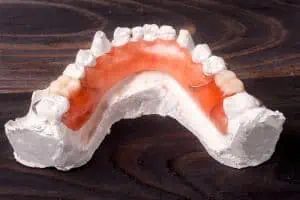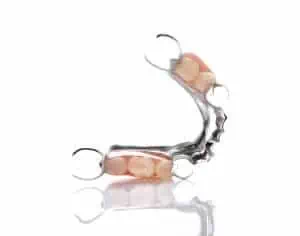If you are missing one or some of your natural teeth, there are different options for getting them replaced, and one of the most affordable options is partial dentures.
To help you gain awareness of your options, we’ll include information in this article about:
- Types of dental partial dentures
- How much do partial dentures cost?
- How much do partial dentures cost without insurance?
- Partial denture eligibility
So, keep reading to find out all you need to know about this tooth-replacement option. You can also read about regular denture in our guide.
What is a partial denture?
A partial denture is a type of dental prosthetic that consists of a plate with one or more false teeth attached to it. The base of this dental prosthetic is gum-colored and the framework is either made of cobalt-chromium metal or plastic.
This plate is worn by people who have a missing tooth or teeth, but who aren’t missing all of their teeth. A partial plate fits into your mouth with clasps that go around your existing teeth and help keep the partial denture in place. Partial dentures are removable just like regular dentures, but unlike dental implants which act as replacements for teeth roots.
How long do partial dentures last?

Partial dentures undergo lots of wear and tear, and no matter how good they are, they aren’t going to be as strong as implants or normal teeth. Your dentures might crack, stain, or erode, causing you to need to replace them.
Another thing that can happen is that your mouth naturally changes shape as you age, and bone loss can occur when you have missing teeth. This can cause your partial dentures to not fit as well as they once did. If this happens, you’ll have to have them replaced as well.
That being said, with the proper care, they should be able to last 5 years or more until you need new ones.
Can you eat with a partial denture?
Your partial dentures are designed so that you don’t have to take them out when you’re eating. You should avoid eating foods that are particularly sticky or hard, so as not to damage them. When you first get them, it will probably be a bit difficult to navigate eating, but start with soft foods cut into small pieces, and in no time you’ll find it’s much easier to eat with false teeth than with no teeth. Your dentist will also give you instructions for proper care.
Types of partial dentures
There is more than just one type of partial denture, in fact, there are plastic, metal – like chrome dentures – and flexible partial dentures. Flexible dentures, like Valplast, tend to be the most expensive, and plastic the cheapest, but that shouldn’t be the only factor used in deciding which is right for you.
In fact, your dentist may prefer a cheaper material over a more expensive material. Every mouth is different and some people may find a certain material too uncomfortable, while for others it’s the best solution, but your dentist will help you choose the best option for you.
Let’s look a little more at the different types of partial false teeth available.
Acrylic removable partial dentures

An acrylic (or plastic) removable partial denture has a plate that is made from plastic, and the false teeth are set into the base. They then are secured in your mouth with small metal clasps that attach to your existing teeth.
These can sometimes be bulkier than metal partial dentures, which we’ll talk about below, but they are also easier to adjust and more affordable. One common type of partial denture when you have just one or two missing teeth is a dental flipper. You can read more about dental flippers in our full article.
Cast metal removable partial dentures
This is probably the most common kind of partial denture. It consists of a cobalt and chromium frame and has either precision attachments or metal attachments. Precision attachments are preferred since they are less noticeable, but they are also the more expensive option.
The frame is not visible because it is covered by a gum-colored synthetic material. Cast metal frames are preferred to plastic, except in the case when a patient has periodontal disease. That’s because periodontal disease can lead to more drastic changes in the shape of your mouth than just the kind of changes that happen with aging, so you will have to get your dentures adjusted more often. Plastic dentures are easier to modify.
Flexible partial dentures
Flexible partial dentures are an option for those who are allergic to acrylic, or experience discomfort from the typical plastic or cast metal partial dentures. These flexible partial false teeth are made from a very thin plastic that is actually flexible. They usually have gum-colored clasps that fit between your natural teeth. These are more expensive than traditional partial dentures, and might not be covered by dental insurance if you have it. Some of the pros of flexible partial dentures include:
- Long-lasting
- Soft and comfortable
- No metal clasps
- Translucent material looks natural against gums
- Lightweight
Have a look at the following video where Dr. Tamisha Denis explains the advantages and disadvantages of metal and flexible partial dentures.
Who can get partial dentures?
Anyone who is missing some of their teeth, but not all of their teeth is eligible for a partial denture. That means that you can get partial dentures for front teeth, partial dentures for back teeth, and both lower and upper partial dentures.
Many people wonder if you can get a partial denture for one tooth, and the answer is yes, as long as you have one or more missing teeth, you can get a partial denture. (As long as you aren’t missing all of your teeth.)
Patients missing one or more teeth may be interested in learning about the benefits of partial dentures. Missing teeth cause the bite pressures to shift in your mouth. This shifting can cause the other teeth to compensate for the “gap” in your bite. Following this, you may experience shrinking of both the soft tissues and the supporting bone close to your missing teeth. This can affect your physical appearance and can lead to more problems with your other teeth.
A partial denture keeps the underlying structures of your mouth – your gums, jawbone, facial muscles, etc. – engaged and active. Prevent further shifting of the other teeth in your mouth, and enjoy the confidence of having a beautiful, complete smile with partial dentures.
Dr. Kevin Varley, Stonebrook Family Dentistry
Cost of partial dentures
Partial dentures cost roughly between $500 and $1,500. The price of partial dentures will vary from patient to patient, depending on the number of teeth needed to be replaced, the dental clinic you go to, and the materials used to make your partial dentures.
If you have Medicaid, whether or not your dentures are covered depends on the state you live in. You’ll have to contact your state Medicaid agency to find out if they cover dental. Read our article on Medicaid denture coverage for more information.

Alternatively, if you have dental insurance that provides coverage for restorative services it could pay up to 50% of your partial dentures cost.
We know that dental insurance can be expensive and it can also be difficult to know which plan to choose.
But we are here for you — we’ve created a special comparison tool that shows you the top plans in your area to help guide you in your decision.
It takes just a few seconds to fill in your DOB and zip code, and you’ll see full coverage plans that cover your needs. Get started with the form below!

How much do partial dentures cost without insurance?
Partial dentures go for a few hundred dollars on the low end and over a thousand dollars on the high end of the scale. The price will depend on how many teeth you need to replace and the materials used in making your dentures. Have a look at the table below to compare the prices for the different types of partial dentures.
Denture type | Price range |
Acrylic partial denture | $650–$1110 |
Cast metal partial denture | $935–$1,975 |
Flexible partial denture | $1,075–$1,487 |
As you can see, plastic partial teeth are the cheapest, and flexible partial dentures cost the most.
Where can I find cheap replacement teeth?
The bad news is that quality dentures can be too expensive for many people who need them. The good news is that there are a plethora of charitable organizations and federally-funded programs that give people in need access to free or affordable partial dentures and other dental work as well. To find out more about your options, read our full guide to free dentures or our article on dental financing.
Conclusion
If you have missing teeth, it’s important to get them replaced, and not just for aesthetic reasons but for your health as well. If you go a long time without replacing your teeth, your jaw bone can begin to deteriorate and your other teeth might move into the empty space left by your missing tooth. Dentures can’t do much for bone loss (you’ll need implants for that) but they can stop your other teeth from moving into the empty space, and they can help keep your facial muscles from sinking inwards.
You’ll also have an easier time chewing and eating a wide variety of nutritious foods, and talking will be easier too. Not to mention you’ll get to leave behind any self-consciousness you may experience as a result of having gaps in your smile.
So, we hope this article has filled you in on what exactly a partial denture is, and how much you might have to pay, so you can make the best decision for your oral health.
FAQs
What material for partial dentures is better?
The best material depends on your particular situation. Metal is generally more durable than plastic, and is more expensive. However, it isn’t the best material for those with periodontal disease. If you have gum disease, the shape of your mouth will change more, and you’ll have to have your partial false tooth or teeth adjusted more often. Plastic partial dentures are easier to modify than metal dentures. However, Some people may be allergic to plastic, in which case they’ll need to get either metal or flexible dentures. Your dentist will help you decide which is the best material for you.
Can I get an upper partial denture?

Most people are eligible for upper partial dentures. You can get a partial denture for any of your missing teeth, as long as you aren’t missing all of your teeth.
Where can I find cheap partial dentures?
There are various ways to find affordable or free partial dentures, many of which are federally funded or offered by charity organizations. Ask your dentist about a payment plan. You can also go to a dental school or find a free dental clinic.
NCBI: Metal vs Acrylic Partial Removable Dentures for Patients with Periodontal Disease: A Review of the Clinical Effectiveness and Guidelines. Consulted 14th January 2020.
ADA.org: Missing Teeth. Consulted 14th January 2020.




